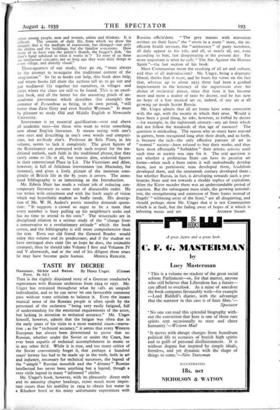TASTE BY DECREE
Hammer, Sickle and Baton. By Heinz Unger. (Cresset Press. 8s. 6d.)
Tills is the slightly disjointed story of a German conductor's experiences with Russian orchestras from 1924 to 1937. Mr. Unger has remained throughout what he calls an unspoilt individualist, and so he can never let one favourable comment pass without some criticism to balance it. Even the innate musical sense of the Russian people is often spoilt by the personnel of the orchestra " being very easily fatigued, full of understanding for the emotional requirements of the score, but lacking in attention to technical accuracy." Mr. Unger himself, however, admits that the fatigue was often due in the early years of his visits to a most material cause—starva- tion ; as for " technical accuracy," it seems that every Western European has always been determined to prove that no Russian, whether under the Soviet or under the Czars, has ever been capable of technical accomplishment in music or in any other field. While it is true, and too many critics of the Soviet conveniently forget it, that perhaps a hundred years' leeway has had to be made up in the tools, both in art and industry, necessary for technical successes, the legend of the " simple " Russian mouzhik and the " dreamy " Russian intellectual has never been anything but a legend, though a very virile legend in many " informed " circles.
Mr. Unger's book, however, with its pleasantly direct style and its amusing chapter headings, raises much more impor- tant issues than his inability in 1924 to obtain hot water in a Kharkov hotel or his many unfortunate experiences with
Russian officia:dom. " The grey masses with starvation written on their faces," the " seven in a room " story, the in- efficient health services, the " aristocracy " of party members, all duly appear in his tale, and all, or nearly all, arc, even according to him, fast disappearing at the present day. Far more important is what he calls " The Sin Against the Human Spirit "—the last section of his book.
Must Communism mean the crushing of all art and culture, and thus of all individualism? Mr. Unger, being a dogmatic liberal, thinks that it must, and he bases his views on the fact that, whereas up to about 1933 there had been a gradual improvement in the leniency of the supervision over his choice of orchestral pieces, since that time it has become more and more a matter of taste by decree, and he has now no hope of a free musical art or, indeed, of any art at all growing up inside Soviet Russia.
Mr. Unger admits that all art forms have some connexion with the age, with the society in which they arise. Would it have been a good thing, he asks, however, to forbid by decree —for example, in the eighteenth century—any art form which did not follow the standards of that age of rococco? The question is misleading. The reason why so many have starved in garrets, been recognised long after their death, and so forth, is because the rich—the only effective patrons of art in " normal " society—have refused to buy their works, and thus have most effectually " forbidden " their artistic activity until such time as society was ripe for it. The real question is not whether a proletarian State can have its peculiar art forms—when such a State exists it will undoubtedly develop them, just as prehistoric man developed them, feudalism developed them, and the nineteenth century developed them ; but whether Russia, in fact, is developing towards such a pro- letarian State and not towards a shoddy replica of capitalism. After the Kirov murder there was an understandable period of reaction. But the subsequent mass trials, the growing national- ism, the strengthening and extension of State forms instead of Engels' " withering away of the State," are all disquieting, and should perhaps show Mr. Unger that it is not Communism which is at fault, but the fading away of hopes of it which is








































 Previous page
Previous page